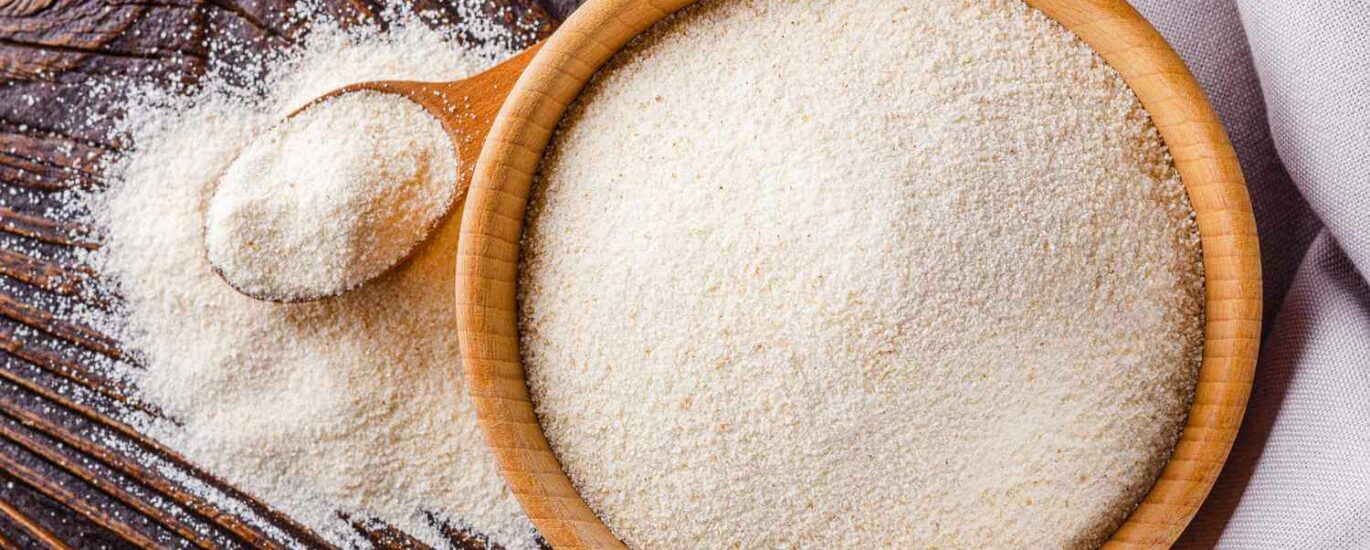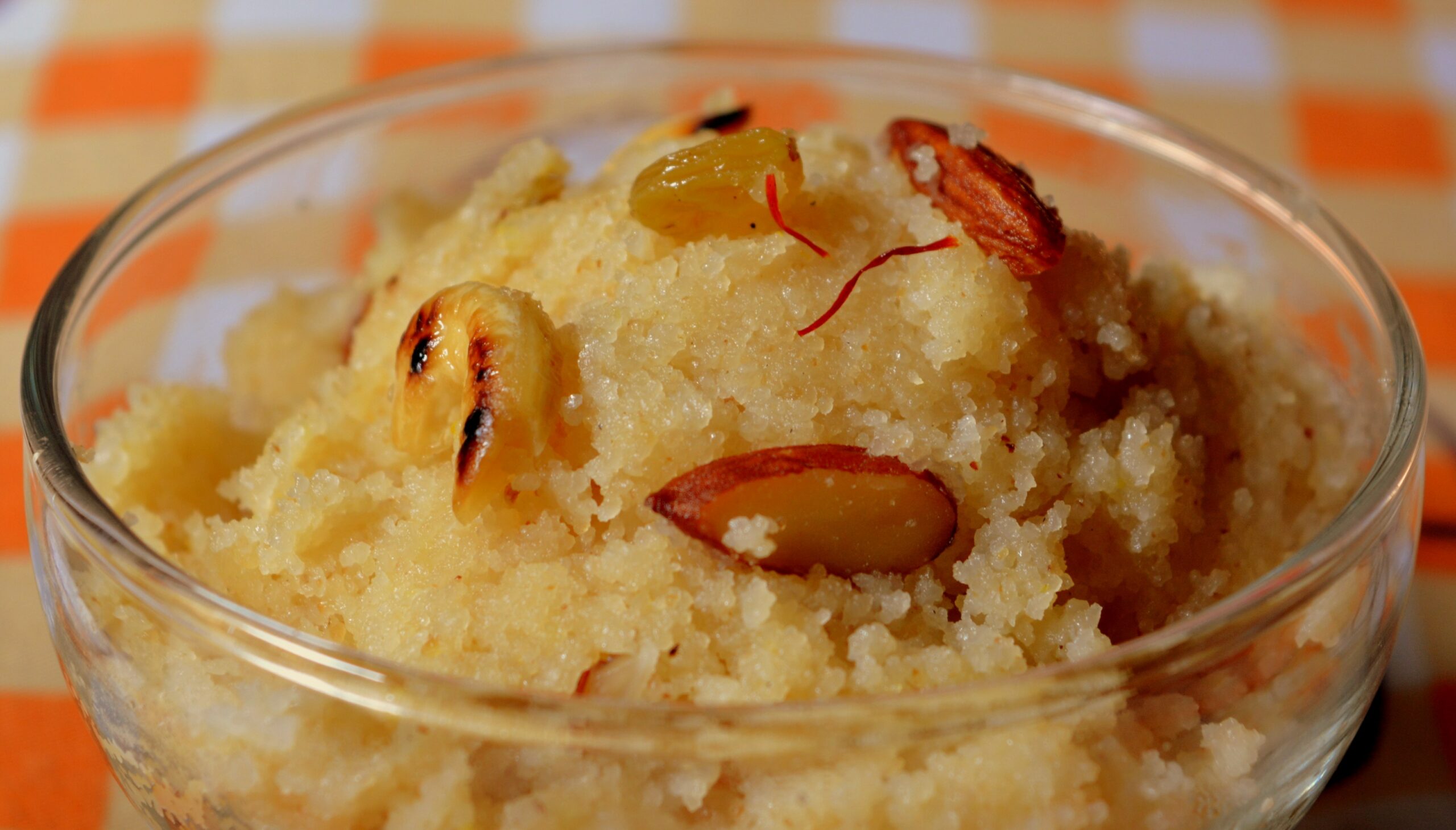


Suji, also known as semolina or rava, is a coarse, granular wheat product that is popular in Indian cuisine. It is often used in dishes such as upma, idlis, and halwa, and has a nutty flavor and a grainy texture. Suji is not only versatile and delicious, but it also has several nutritional benefits that make it a popular choice for those looking to lose weight. This article will explore the question, “Is suji good for weight loss?” by examining the nutritional composition of suji and its potential benefits for weight loss.
Suji is a coarsely ground flour that is made from durum wheat, which is a hard variety of wheat. It is commonly used in Indian and Middle Eastern cuisine and is a versatile ingredient that can be used in both sweet and savory dishes. It is most popular due to it’s unique taste. Suji originated in the Middle East and has been used for centuries in traditional cuisine. It was introduced to India during the Mughal period and has since become a staple ingredient in Indian cooking.
Suji is a rich source of nutrients, including carbohydrates, protein, fiber, and several vitamins and minerals. A 100-gram serving of suji contains:
While suji is a nutrient-dense food, it is also high in calories. One cup of uncooked suji contains approximately 600 calories, which can be a significant portion of a person’s daily calorie intake. However, when consumed in moderation and in combination with other healthy foods, suji can be a beneficial food for weight loss.
The role of suji’s properties in weight loss
Suji has a low glycemic index, which means that it is slowly digested and absorbed by the body. This results in a slow and steady release of glucose into the bloodstream, which can help prevent spikes in blood sugar levels. High blood sugar levels can cause the body to store excess glucose as fat, which can contribute to weight gain.
Suji is also high in fiber, which can help promote feelings of fullness and reduce hunger. Fiber also helps regulate the digestive system and can prevent constipation, which can be a common problem when trying to lose weight.
Suji is a good source of protein, which is essential for building and repairing muscle tissue. Protein also helps keep you feeling full and satisfied, which can prevent overeating and snacking on unhealthy foods.
Suji is a complex carbohydrate, which means that it is slowly digested and provides sustained energy. This can help prevent energy crashes and can provide the energy needed for physical activity, which is essential for weight loss.
The slow digestion of suji can help reduce cravings for sugary and high-calorie foods, which can contribute to weight gain. By reducing cravings, suji can help individuals stick to a healthy and balanced diet.
Suji is also rich in B vitamins, which are essential for proper metabolism. These vitamins help convert food into energy and can improve the body’s ability to burn fat. A healthy metabolism is crucial for weight loss, as it determines how efficiently the body burns calories.
Suji is a versatile ingredient that can be used in a variety of healthy recipes. It can be used to make healthy breakfast dishes such as upma or idlis, as well as savory dishes like veggie burgers or stuffed peppers. By incorporating suji into a balanced diet, individuals can enjoy a variety of nutritious meals while also working towards their weight loss goals.
Substituting suji for high-calorie foods
One way to incorporate suji into a weight loss diet is to use it as a substitute for high-calorie foods. For example, instead of using white bread for sandwiches or toast, use suji bread or toast. Suji can also be used as a substitute for pasta in dishes like lasagna or spaghetti.
Adding suji to healthy recipes
Suji can be added to a variety of healthy recipes to increase their nutrient content and promote feelings of fullness. For example, suji can be added to smoothies or protein shakes for a boost of protein and fiber. Suji can also be used in healthy baking recipes like muffins or pancakes.

Creating healthy meals with suji
Suji can be used to create healthy meals that are both delicious and nutritious. For example, suji can be used to make a healthy breakfast dish like upma, which is made with vegetables, spices, and suji. Suji can also be used to make a healthy snack like suji toast, which is made with suji, vegetables, and spices.
While suji can be a beneficial food for weight loss, it is important to consume it in moderation. Suji is high in calories, and consuming too much can contribute to weight gain. Portion control is also a key when consuming suji for weight loss. It is important to measure out the appropriate serving size and not to exceed it. Suji should be consumed as part of a balanced diet that includes a variety of nutrient-dense foods. It should not be the only food consumed in a weight loss diet.
Exercise
In addition to consuming suji as part of a balanced diet, incorporating regular exercise into a weight loss plan can be beneficial. Exercise can help burn calories and improve metabolism, leading to more efficient weight loss.
Hydration
Staying hydrated is also important for weight loss. Drinking enough water can help reduce cravings and promote feelings of fullness.
Sleep
Getting enough sleep is also crucial for weight loss. Sleep deprivation can lead to imbalanced hunger hormones, making it more difficult to stick to a healthy diet and achieve weight loss goals.
Serves: 2
Cooking Time: 15 mins
Serves: 2
Cooking time: 40 minutes
Suji provides a wide range of benefits that are beneficial for overall health, including the following:
Suji is naturally low in saturated fat, which benefits heart health. Also, it contains dietary fibre, which can help reduce cholesterol levels in the blood. According to one study, ingesting more fibre can lower heart disease risk. In addition, semolina is a good source of complex carbohydrates, providing a steady energy source without causing spikes in blood sugar levels. High blood sugar levels can damage blood vessels and increase the risk of heart disease. Finally, semolina contains other nutrients like folate and magnesium, improving heart health.
Iron is essential in producing haemoglobin, a protein in red blood cells. Haemoglobin helps transport oxygen throughout the body. Iron is also critical to maintaining healthy immune function and overall well-being.
Although it contains a moderate amount of iron, it can help when combined with other healthy foods. For example, consuming semolina with foods rich in vitamin C, like tomatoes and lemon or other citrus fruits, improves iron absorption in the body.
Semolina is high-carb with a moderate glycemic index, which can cause a moderate increase in blood sugar levels after consumption. Foods with a high glycemic index get digested fast and, as a result, can cause a rapid spike in blood sugar levels, especially for individuals with diabetes or those at risk of developing diabetes. Therefore, it is a good choice for such people.
Semolina’s high magnesium and dietary fibre content help with blood sugar regulation. Maintaining appropriate blood sugar levels is critical in lowering your risk of type 2 diabetes and heart disease. Magnesium helps control blood sugar by enhancing cells’ responsiveness to insulin. As a result, this hormone regulates blood sugar levels. Studies also show that magnesium-rich diets lead to a lower incidence of diabetes.
Is Jackfruit Good For Weight Loss?
7-Day Diet Plan For Weight Loss: Is It Right For You
Is Quinoa Good For Weight Loss? Quinoa Effects On Health
Suji can be included in a healthy and balanced weight loss diet. Its low glycemic index, high fiber content, and protein content make it a beneficial food for weight loss. However, it is important to consume suji in moderation and in combination with other healthy foods. Avoid high-calorie preparations and measure your portions to ensure that you are not overeating. By following these tips, you can enjoy suji as a part of a healthy and nutritious weight loss diet.
A: Suji, known as semolina, is a coarse durum wheat flour. You find suji in pasta, bread, macaroni and similar products. In addition, you can make desserts like halwa and breakfast preparations such as porridge, upma, idli, and dosa. One can also use it to thicken soups and make pulao. It is a versatile ingredient rich in protein and low in fat, making it a popular choice for those trying to follow a healthy diet.
A: Suji helps in weight loss since it is high in protein and contains some fibre. It helps lower cravings and enhance feelings of fullness, resulting in fewer calories consumed and weight loss. However, it is crucial to note that weight loss ultimately depends on consuming fewer calories than you burn via physical activity. Thus suji should be consumed as part of a well-balanced, calorie-controlled diet.
A: Suji is high in protein and contains fibre, which promotes a sense of satiety. It also includes iron and magnesium, supporting red blood cell synthesis, heart health, and regulating blood sugar.
A: Suji is low in calories when compared to other grains and flour. However, the calorie value of suji-based foods, such as upma or halwa, varies depending on the other ingredients and cooking methods. Therefore, evaluating the overall calorie count of meals and snacks is critical when including suji in a weight management regimen.
A: The amount of suji you should eat for weight loss is determined by your specific calorie requirements and weight loss goals. You can consume approximately 30-60 g of semolina daily, depending on your age, gender and other dietary choices.
A: Suji intake may be harmful to persons who are gluten intolerant, have celiac disease, constipation, or have recurring gastrointestinal pain. Some possible adverse effects are nausea, vomiting, indigestion, diarrhoea, sneezing, and headaches.
A: Suji has been an integral component in Indian kitchens for centuries. The best part is that you may eat it in various ways. Dosa, upma, uttapam, idli, and dosa are healthy options. To make it healthier, club it with other healthy ingredients and make the dishes of your choice.
A: Suji can be consumed at night for weight loss if it fits within your day’s calorie and nutritional goals. However, it is crucial to remember that eating big servings or high-calorie versions of suji foods, and eating it closer to bedtime or leading a sedentary life, can result in weight gain instead of weight loss.
A: The time it takes to observe weight loss results from suji depends on several factors, including your overall diet, level of physical activity, and individual metabolism. The initial stage of weight loss is when you lose the most weight and notice changes in your look and clothing fit. It typically occurs within the first 4-6 weeks. However, consuming suji alone is not a guarantee of weight loss because it is necessary to maintain an overall calorie deficit to lose weight.
Q: Should I consult a nutritionist before consuming suji for weight loss?
A: Speaking with a nutritionist or trained dietitian before making significant dietary changes is always a good idea. A nutritionist or registered dietitian may advise you on the appropriate amount of suji to consume based on your particular calorie and nutritional requirements and how to incorporate suji into a balanced and diverse diet.